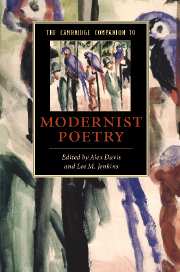3 - The poetics of modernism
from Part I: - Contexts
Published online by Cambridge University Press: 28 November 2007
Summary
'Said Yo-Yo: / “What part ob yu iz deh poEM?”.' Tucked away in one of the late Cantos that Ezra Pound wrote during his thirteen-year incarceration in St Elizabeths hospital, this question from a fellow inmate is offered as light relief in a passage which has already praised Adolf Hitler as a leader 'furious from perception'. In such a context, readers are unlikely to linger over Yo-Yo's question, cast as it is in a damaged idiom that serves only to reinforce the apparent obtuseness of its underlying assumption: Pound is a poet, ergo his poem must exist somewhere in his person. The association is silly, of course, though it has a certain irony when proposed in a place where bodies are hardly at their best. But, whether or not it is recorded here for that reason, Yo-Yo's question does remind us that, while a modernist poetics seems to emerge from a distrust of earlier conceptions of poetry as ethereal and disembodied, it is also founded in a partial and strategic dissociation of the poet from the poem. In light of this, to ask where the poem 'is' - to wonder which part of the poet's person it might seem to occupy - might prompt us to ask where it comes from in the first place, a question of a rather different order and one which may shed more light on modernist poetics than Yo-Yo could have suspected. Traditional answers to the conundrum frequently appeal to the function of memory, especially the Platonic form of recollection, and in practice, of course, especially in periods before our own, poetry did have close ties to memory, not least through the common practice of learning by heart.
- Type
- Chapter
- Information
- The Cambridge Companion to Modernist Poetry , pp. 51 - 67Publisher: Cambridge University PressPrint publication year: 2007
- 3
- Cited by



